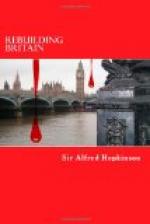It was pointed out years ago that the House of Commons was in practice ceasing to be what it ought, according to Constitutional theory, to be, “a deliberative assembly of the representatives of the nation discussing and forming judgments on national policy, instituting legislation and determining its form,” and was becoming simply “a body for registering the decrees of a Cabinet.” In practice it was assumed to be “the duty of the minority in opposition to find objections to the proposals of the Government, representing the majority, and to occupy time in voting against them as often as possible, and on the other hand that it is the duty of the majority to refrain from discussion, to applaud Ministers, and to make sure that whatever they propose shall be carried by undiminished numbers.” In this respect the present House is no worse than its predecessors for the last thirty years; the political truce has indeed improved matters in some respects. It is at least doubtful whether under “pre-War conditions” either the Representation of the People Bill or the Education Bill could have been carried, certainly they would not have been passed in a form to secure so much general consent. Instead of such consent, some measure strongly opposed by a minority might have been forced through by free use of the closure. A new danger has arisen, however, of a still more serious kind, threatening the position of the House of Commons. It is that, instead of national policy being controlled by legislation, settled by a recognised constitutional body elected according to definite rules and representing the nation, the real power of initiative and real directing force may pass to some other body or bodies unknown to the law and representing only a class or even to certain writers in the popular Press.




